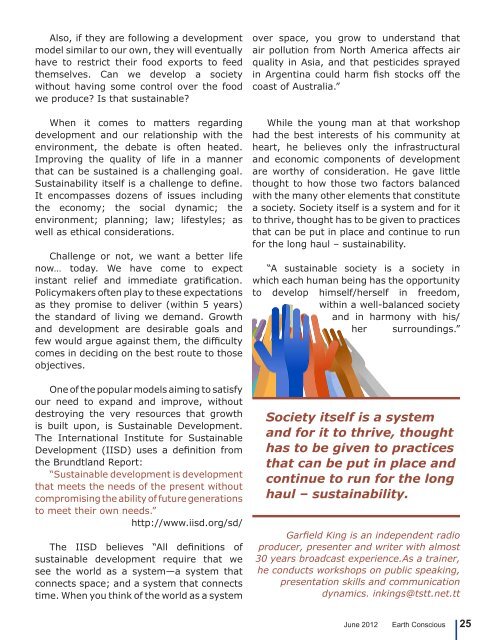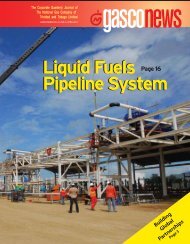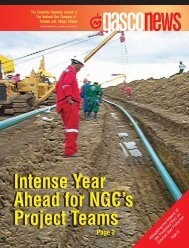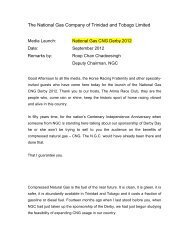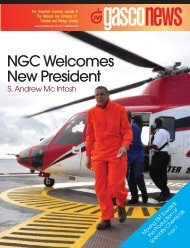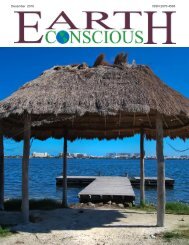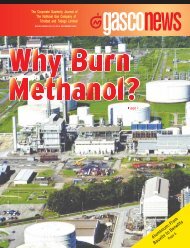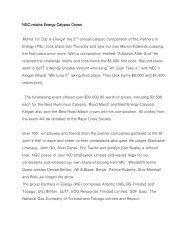June 2012 ISSN 2070-4593 - NGC
June 2012 ISSN 2070-4593 - NGC
June 2012 ISSN 2070-4593 - NGC
You also want an ePaper? Increase the reach of your titles
YUMPU automatically turns print PDFs into web optimized ePapers that Google loves.
Also, if they are following a development<br />
model similar to our own, they will eventually<br />
have to restrict their food exports to feed<br />
themselves. Can we develop a society<br />
without having some control over the food<br />
we produce? Is that sustainable?<br />
When it comes to matters regarding<br />
development and our relationship with the<br />
environment, the debate is often heated.<br />
Improving the quality of life in a manner<br />
that can be sustained is a challenging goal.<br />
Sustainability itself is a challenge to define.<br />
It encompasses dozens of issues including<br />
the economy; the social dynamic; the<br />
environment; planning; law; lifestyles; as<br />
well as ethical considerations.<br />
Challenge or not, we want a better life<br />
now… today. We have come to expect<br />
instant relief and immediate gratification.<br />
Policymakers often play to these expectations<br />
as they promise to deliver (within 5 years)<br />
the standard of living we demand. Growth<br />
and development are desirable goals and<br />
few would argue against them, the difficulty<br />
comes in deciding on the best route to those<br />
objectives.<br />
One of the popular models aiming to satisfy<br />
our need to expand and improve, without<br />
destroying the very resources that growth<br />
is built upon, is Sustainable Development.<br />
The International Institute for Sustainable<br />
Development (IISD) uses a definition from<br />
the Brundtland Report:<br />
“Sustainable development is development<br />
that meets the needs of the present without<br />
compromising the ability of future generations<br />
to meet their own needs.”<br />
http://www.iisd.org/sd/<br />
The IISD believes “All definitions of<br />
sustainable development require that we<br />
see the world as a system—a system that<br />
connects space; and a system that connects<br />
time. When you think of the world as a system<br />
over space, you grow to understand that<br />
air pollution from North America affects air<br />
quality in Asia, and that pesticides sprayed<br />
in Argentina could harm fish stocks off the<br />
coast of Australia.”<br />
While the young man at that workshop<br />
had the best interests of his community at<br />
heart, he believes only the infrastructural<br />
and economic components of development<br />
are worthy of consideration. He gave little<br />
thought to how those two factors balanced<br />
with the many other elements that constitute<br />
a society. Society itself is a system and for it<br />
to thrive, thought has to be given to practices<br />
that can be put in place and continue to run<br />
for the long haul – sustainability.<br />
“A sustainable society is a society in<br />
which each human being has the opportunity<br />
to develop himself/herself in freedom,<br />
within a well-balanced society<br />
and in harmony with his/<br />
her surroundings.”<br />
Society itself is a system<br />
and for it to thrive, thought<br />
has to be given to practices<br />
that can be put in place and<br />
continue to run for the long<br />
haul – sustainability.<br />
Garfield King is an independent radio<br />
producer, presenter and writer with almost<br />
30 years broadcast experience.As a trainer,<br />
he conducts workshops on public speaking,<br />
presentation skills and communication<br />
dynamics. inkings@tstt.net.tt<br />
<strong>June</strong> <strong>2012</strong> Earth Conscious 25


